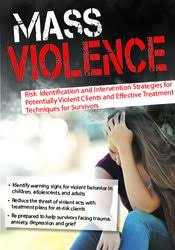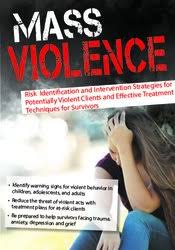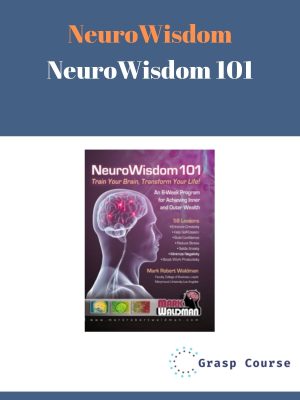Kathryn Seifert – Mass Violence, Risk Identification and Intervention Strategies for
$200.00 Original price was: $200.00.$75.05Current price is: $75.05.
Buy today and feel ready and able to identify the risk factors, effectively intervene with clients at-risk of performing violent acts, and provide hope and healing to those whose lives have been engulfed by mass violence.
Kathryn Seifert – Mass Violence, Risk Identification and Intervention Strategies for
Following acts of mass violence clinicians are often left feeling powerless, anxious and looking for answers.
Why does this happen? Can I identify the warning signs and Intervene with those at-risk of committing violent acts? What can I do to help survivors facing the devastating scars of trauma, anxiety, panic depression and grief left behind by unspeakable violence?
A must-watch for mental health professionals working in an era of pervasive violence, this critical recording will explore the connection between mental health issues and violence, analyze research and research limitations surrounding its study, and contemplate the role of clinicians in both the prevention and aftermath of mass violence.
Better still, this seminar will go beyond the research and give you detailed clinical guidance on working with a variety of populations and ages, including children, adolescents, parents and community members who may walk into your office as a person at-risk of committing a violent act or as a survivor of one.
YOU CAN’T AFFORD TO BE UNPREPARED
Buy today and feel ready and able to identify the risk factors, effectively intervene with clients at-risk of performing violent acts, and provide hope and healing to those whose lives have been engulfed by mass violence.
- Distinguish key contributing factors to the development of Complex PTSD as it relates to client case conceptualization.
- Explore how Complex PTSD impacts the cognitive, emotional, and physical health of the client.
- Determine how to assess clients for Complex PTSD symptoms within other diagnoses, including personality disorders, mood disorders, anxiety disorders, and dissociative disorders.
- Incorporate into clinical treatment practical mind-body therapy tools to help clients feel resourced and prepared for trauma processing.
- Articulate the six stages of trauma responses within the neurobiology of Complex PTSD as it relates to clinical treatment.
- Utilize assessment tools to properly assess for Complex PTSD to better inform treatment planning.
- Breakdown how mutual regulation within the therapeutic relationship teaches clients self-regulation strategies that help them develop new interpersonal strengths that help with the treatment process.
- Integrate interventions for the treatment of Complex PTSD drawn from CBT, DBT, EMDR Therapy, Parts Work Therapy, Somatic Psychology, and mind-body therapies.
- Recognize how working within the “Window of Tolerance” can help reduce the likelihood of re-traumatization.
- Describe how “top-down” and “bottom-up” interventions can speed up or slow down the pacing of trauma treatment.
- Employ the 6 Pillars of Resilience as a strength-based approach that fosters growth and integration of a positive sense of self-identity in clients.
- Identify self-care practices for therapists to help with self-care before, during, and after sessions when dealing with trauma to improve therapeutic alliance and prevent burnout.
Would you like to receive Kathryn Seifert – Mass Violence, Risk Identification and Intervention Strategies for ?
Post-Traumatic Stress Disorder vs. Complex PTSD: Understand the Difference
- Acute traumatic stress, PTSD, Complex PTSD
- Diagnostic clarification and differential diagnosis
- Key contributing factors of Complex PTSD
- The common symptoms of Complex PTSD
The Neurobiology of PTSD: Beyond Fight and Flight
- Polyvagal Theory
- 6 Stages of trauma response
- Heart Rate Variability and the Social Nervous System
- Interpersonal Neurobiology
- Psychobiological regulation
- Rupture and repair
- Implications of childhood neglect or abuse
- Neuroplasticity and Complex PTSD
Psychological and Physiological Repercussions of Complex PTSD: A Deeper Understanding for Accurate Assessment
- Intrusive symptoms and anxiety
- Emotional dysregulation: Outbursts of anger and debilitating shame
- Avoidance symptoms and phobic reactions to traumatic material
- Interpersonal problems and difficulty being close to others
- Dissociation and dysregulation
- Cognitive distortions and compromised meaning making
- Physical health problems, ACE factors and painful somatization
- Preverbal and nonverbal memories
- Disturbing somatic sensations
- Depressive symptoms
- Learned helplessness and shame
Therapeutic Interventions for Complex PTSD: Summary of Effective Therapies
- Psychodynamic and Relational Therapy
- Psychobiological perspectives: Polyvagal Theory
- Cognitive Behavioral Therapy (CBT)
- Dialectical Behavioral Therapy (DBT)
- EMDR Therapy
- Somatic Psychology
- Parts Work Therapy: Work with Ego States
- Complementary and Alternative Medicine (CAM): mindfulness, yoga, and integrative healthcare
Integrative Treatment for Complex PTSD: Putting it All Together for an Effective Treatment Plan
- A biopsychosocial approach: Partner with clients to build a health care team
- Goal of treatment: Memory retrieval vs. trauma recovery
- History taking: Identify chronic, repeated, and/or developmental trauma events
- Cultural factors and Complex PTSD
- Recognize attachment Injuries
- How to work with transgenerational trauma
- Identify parts, ego states and defenses
- Assess for dissociation
- Mutual regulation and relational repair in therapy
- Prepare for trauma processing: Develop resources and stability
- Work through traumatic memories: EMDR and Somatic Psychology
- Grief work in Complex PTSD
- Integrate and Instill positive change
Experiential Interventions: Mind-Body Practices for Clients with Complex PTSD
- Conscious breathing for self-regulation
- Grounding and sensory awareness
- Containment: Reclaim choice and control
- Build imaginal allies
- Cultivate mindfulness, acceptance, and self-compassion
- Somatic interventions: Titration, sequencing, and somatic re-patterning
- Bilateral stimulation and dual attention in EMDR Therapy
- Potential risks and limitations of mind-body therapies
Fostering Resilience: For Post-Traumatic Growth and Healing
- Learn the 6 Pillars of Resilience
- Trauma recovery and the bell curve
- Resilience as a process and an outcome
- Help clients move from learned helplessness to learned optimism
- Post-Traumatic Growth: Help clients reach their potential
Vicarious Trauma: Improve Client Outcomes Through Effective Self-Care
- Identify resources that improve your clinical skills
- In-session self-care to improve focus on the client and therapeutic process
- Burnout prevention techniques
Be the first to review “Kathryn Seifert – Mass Violence, Risk Identification and Intervention Strategies for” Cancel reply
Related products
NLP - Self-help - Dating
NLP - Self-help - Dating
NLP - Self-help - Dating
NLP - Self-help - Dating
NLP - Self-help - Dating
Deepak Chopra & Oprah Winfrey – 21 Day Meditation Experience (19 Volumes Collection)
NLP - Self-help - Dating
NLP - Self-help - Dating
Richard Bandler – 30 Courses Collection | Happy Life, Neuro Hypnotic, Persuasion, …
NLP - Self-help - Dating













Reviews
There are no reviews yet.